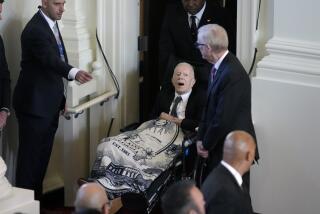She lighted the way
IT OFTEN TAKES JUST THE RIGHT SPARK at just the right time to ignite a fire. Rosa Parks was that perfect spark.
On the surface, her narrative at that defining moment in 1955 in Montgomery, Ala., was both compelling and pure: Simple seamstress refuses to give up her seat to a white bus rider, despite a law demanding that she do so. It may not really have been quite that simple, or unplanned. At the time, she was secretary of the NAACP chapter in Montgomery. What is indisputable is that like many African Americans oppressed by the South’s Jim Crow laws, she was tired, not from working on her feet all day but from the unfairness of it all.
The NAACP saw in the modest Parks a perfect test case, one that became a symbol of the entire civil rights struggle.
Though she was more an icon than a major participant, her effect on the giants who followed was undeniable. She served in a John the Baptist role for the Rev. Martin Luther King Jr., her story paving the way for the crusades of the then little-known minister. Her spirit was reflected in the men, women and children who withstood beatings, blasts from fire hoses and jail time, some dying to advance equality.
The women’s movement also owes her a debt. We see echoes of Parks in the protester standing in front of a tank in Tiananmen Square, in corporate whistle-blowers and in the man whose video camera recorded the beating of Rodney King. Right image, ripe moment.
Parks, who died Monday night at 92 after battling dementia for years, made a simple, brave decision that marked a turn in history. Her enduring message was that average citizens have a duty to respond when conscience calls.
More to Read
Sign up for Essential California
The most important California stories and recommendations in your inbox every morning.
You may occasionally receive promotional content from the Los Angeles Times.










